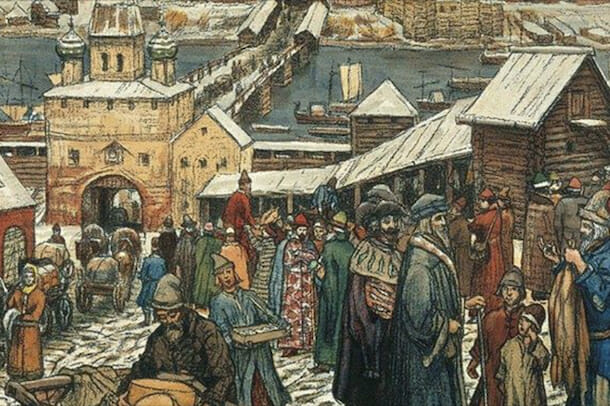
Imperial China, Medieval Europe & Capitalism
A few centuries ago things looked pretty hopeless for Europe. The region was splintered among hundreds of local principalities with no unifying government, common currency, or common language. If today’s typical political scientist had had to guess where a system of market capitalism would have arisen, it is doubtful he or she would have considered Europe a likely candidate. Instead China, with a unifying government and legal system, would have topped the list.
Yet capitalism did not arise in China’s structured environment, but rather amidst the political chaos of Europe. The very facets of medieval European life that today would be frowned on were necessary for the rise of capitalism. It evolved because it was free to evolve; its rules and principles were discovered, not imposed. And with the rise of capitalism, Europeans saw the emergence of classical-liberal political theories and concepts of human rights.
The centralized system of China, in comparison, didn’t allow such freedom, and thus short-circuited the discovery process. As David Landes writes in The Wealth and Poverty of Nations, what the Chinese state “did not take, it oversaw, regulated and repressed.” In The Future and Its Enemies, Virginia Postrel talks about how China shunned the dynamism of an evolving system: “That reactionary ideals, technocratic administration and monopoly power converged to enforce stability at the cost of stagnation. Even in its creative period, China’s dynamism was primarily technological, not social, economic, or political; the government was both highly bureaucratic and absolutist…The governing philosophy was one of order, subordination, and stasis. And like most bureaucracies, the Mandarinate developed a strong interest in protecting the status quo. The system became reinforcing — a sterile verge between interests and ideology.”
More important than the regime’s hostility to innovation was its monopoly on power. Would-be Chinese innovators had no outlet. The Chinese Empire encompassed the equivalent of a continent, leaving no havens of creativity nearby and because Chinese invention had always occurred under state auspices, there were no private enterprises to provide money and encouragement once the government stopped supporting innovation. State subsidies and hence progress itself could be turned off like a faucet.
Liberation of Civil Society
Jean Baechler in The Origins of Capitalism argues, “The first condition for the maximization of economic efficiency is the liberation of civil society with respect to the state. The expansion of capitalism owes its origins and raison d’être to political anarchy.” Historian Ralph Raico says that Europe benefited because it was “radically decentralized” unlike China and India and that, “Instead of experiencing the hegemony of a universal empire, Europe developed into a mosaic of kingdoms, principalities, city-states, ecclesiastical domains, and other political entities.”
The great modern European nations like France, Germany, and Italy were broken into hundreds of smaller political jurisdictions. The citizen of a German principality could move to another German political jurisdiction without experiencing a major culture shock. The only things that changed were the political policies. Because of this mosaic, economic policies were localized. Areas experimented with different systems, and while some retained the feudal top-down system of control, others started freeing up the economy. If taxes and regulations in one kingdom became oppressive, people could move to a neighboring one. The difficulty in preventing such migration acted as a check on the power to tax. Regions that followed more liberal policies prospered over those that didn’t. This is known as the demonstration effect, which, “helped spread the liberal politics that brought prosperity to the towns that first ventured to experiment with them,” Raico writes.
Landes elaborates: “European rulers and enterprising lords who sought to grow revenues…had to attract participants by the grant of franchises, freedoms, and privileges — in short, by making deals. They had to persuade them to come…These exemptions from material burdens and grants of economic privilege, moreover, often led to political concessions and self-government. Here the initiative came from below, and this too was an essentially European pattern. Implicit in it was a sense of rights and contract — the right to negotiate as well as petition — with gains to the freedom and security of economic activity.”

The involuntary devolution of power in Europe encouraged the social evolution that Postrel discusses. In every culture has visionaries who see a potential for advancement and betterment. Landes notes that, “where authority is divided, dissent flourishes. This may be bad news for certainty and conformity, but it is surely good for the spirit and popular initiatives.”
The conservative, in the true sense of the word, fears this change. Centralized power and a regulated economy are “conservative”; they seek to prevent the dynamism and evolution of a free society. The truly radical movement of the time was economic individualism. And many observers have rightfully see socialism as a “conservative” counterrevolution that attempted to preserve the feudal order.
Reaction against Individualism
Social reform movements formed in response to individualism. In A General History of Socialism and Social Struggle, Max Beer writes that these movements advocated, “a modernized medieval order.” Frightened by change, the reformers, “could not accept ideas and demands and economic practices which were based on individual freedom…[which placed] egoism and self-interest before subordination, commonality and social solidarity.”
W.D.P. Bliss, a founding father of American socialism, in an article for the New Encyclopedia of Social Reform, spoke glowingly of the guild system of medieval Europe. He admitted, “This was paternal, often socialistic in the extreme. It was as we have seen cruel — but it was with a just cruelty.” E.R.A. Seligman, a prominent economist who helped found the American Economic Association, approvingly notes that the guild era “was a period of supremacy of labor over capital, and the master worked beside the artisan.” Thomas Davidson, a founder of the British Fabian Society who later in life acknowledged the superiority of individualism and private property, wrote, “Feudalism was socialism; that is often forgotten.” No wonder Walter Lippmann said that collectivism “is reactionary in the exact sense of the word.”
We are accustomed to think of dissent in ideological or religious terms only, but it covers a wide range of human activity. Dissent in Europe did challenge traditional political arrangements and theological doctrines, but it also led to a questioning of scientific and technological positions.
With The Reformation and the end of the Catholic monopoly on theology, the human mind was set free to ponder every aspect of human existence. Innovators came to fresh, often radical conclusions. The result was a new technological thinking that exploded into the Industrial Revolution. Landes writes, “The economic expansion of medieval Europe was thus promoted by a succession of organizational innovations and adaptations, most of them initiated from below and diffused by example.” He calls this “The Invention of Invention.”
The demonstration effect took place in specific locations with specific policies. Holland is one example. K.W. Swart writes that “the Dutch Republic was unique in permitting an unprecedented degree of freedom in the fields of religion, trade and politics…In the eyes of contemporaries, it was this combination of freedom and economic predominance that constituted the true miracle of the Dutch Republic.” According to Raico, Holland “emerged itself as a decentralized polity, without a king or court — a ‘headless commonwealth’ that combined secure property rights, the rule of law, religious toleration, and intellectual freedom with a degree of prosperity that amounted to an early modern Wirtsehafiswunder.”
Capitalism did not appear in Russia, although, unlike China, it shared similar cultural and religious values with Western Europe. Barbara Ward writes in Faith and Freedom, “When pagan Russia entered the society of Christian civilization, the missionary task was accomplished by the monks and priests of Eastern Orthodoxy. Absolutist traditions of government were transmitted to the new society at the same time. The Russian state, which began to be reformed in Muscovy after the interregnum of Tartar invasion, grew from the fusion of two tyrannical traditions of government — Orthodox absolutism and Tartar despotism.” Ward notes that “the total collapse of Roman authority” was the reason western Europe evolved toward liberalism, while eastern Europe didn’t. “In Byzantium…bureaucracy remained intact…But in the West the barbarians broke up the old order.”
Thus, ironically, the barbarians who invaded Western Europe were unwittingly responsible for the development of capitalism.
This article was originally posted in The Radical Center.

